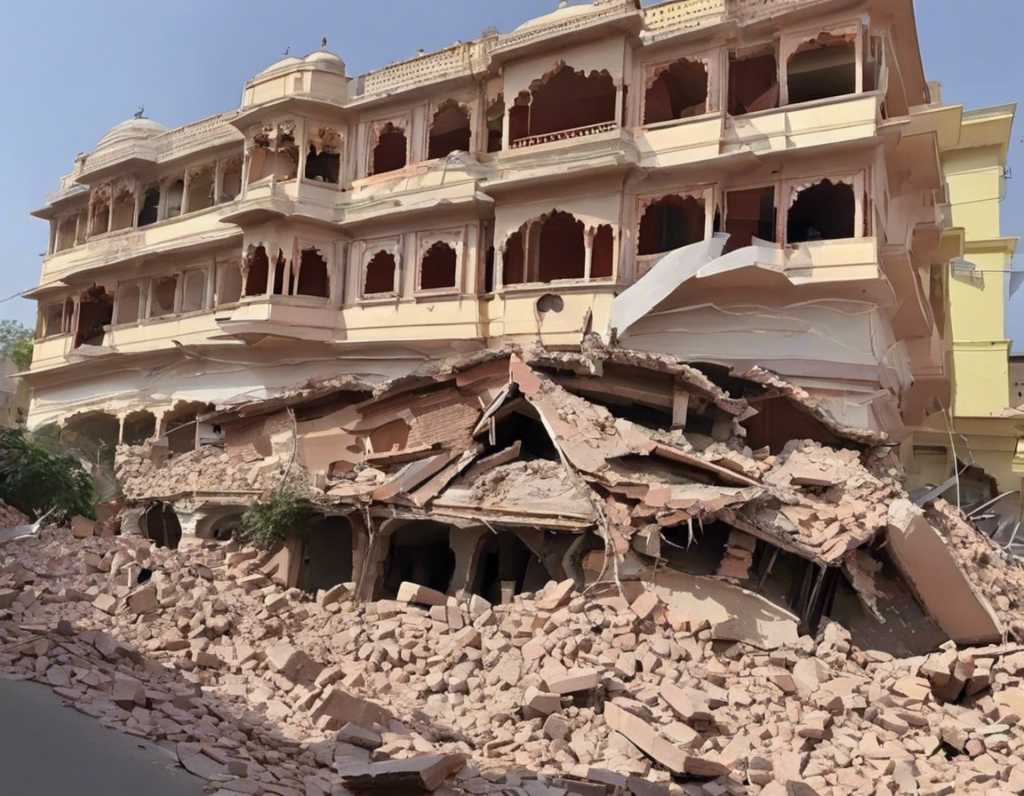Introduction
In recent years, the city of Jaipur, famously known as the Pink City, has experienced a few instances of tremors caused by earthquakes. Situated in a seismically sensitive zone, the earthquake impact on Jaipur has raised concerns about the city’s vulnerability to such natural disasters. This article aims to provide an in-depth analysis of how earthquakes can affect Jaipur, the historical seismic activity in the region, the potential risks posed by future earthquakes, and the steps that can be taken to mitigate these risks.
Historical Seismic Activity in Jaipur
While Jaipur is not situated in a highly active seismic zone compared to other parts of India, it is still susceptible to earthquakes due to its proximity to the Aravalli mountain range and the Delhi-Haridwar Ridge. Over the years, Jaipur has experienced several low to moderate intensity earthquakes. The most significant earthquake in recent times occurred on 26th March 2001, with a magnitude of 4.5 on the Richter scale. This earthquake caused minor damage to structures in Jaipur and served as a wake-up call regarding the city’s seismic vulnerability.
Earthquake Impact on Jaipur
The impact of an earthquake on Jaipur can be far-reaching, affecting not only the city’s infrastructure but also its people and economy. Some of the potential consequences of a major earthquake in Jaipur include:
-
Structural Damage: The old and historic structures in Jaipur, including the iconic Hawa Mahal and City Palace, could be severely damaged in the event of a significant earthquake.
-
Casualties and Injuries: A strong earthquake could lead to loss of life and injuries among residents and tourists in Jaipur.
-
Disruption of Essential Services: An earthquake could disrupt essential services such as water supply, electricity, and communication networks, making it challenging for emergency responders to coordinate relief efforts.
-
Economic Impact: The tourism industry, which is a significant source of revenue for Jaipur, could be severely affected by an earthquake, leading to long-term economic repercussions for the city.
Earthquake Preparedness and Mitigation Measures
To address the potential risks posed by earthquakes, it is essential for Jaipur to focus on earthquake preparedness and mitigation measures. Some steps that can be taken to enhance the city’s resilience to earthquakes include:
-
Building Codes and Regulations: Implementing and enforcing strict building codes that ensure structures are earthquake-resistant can help minimize damage during an earthquake.
-
Public Awareness Campaigns: Educating residents about earthquake safety measures, such as drop, cover, and hold on, can save lives during an earthquake.
-
Emergency Response Planning: Developing robust emergency response plans and conducting drills to test the city’s preparedness for an earthquake can improve the effectiveness of rescue and relief operations.
-
Strengthening Infrastructure: Retrofitting and strengthening critical infrastructure such as hospitals, schools, and government buildings can reduce the risk of collapse during an earthquake.
-
Risk Assessments: Conducting seismic risk assessments to identify vulnerable areas in Jaipur and taking proactive measures to mitigate these risks can help minimize the impact of future earthquakes.
Frequently Asked Questions (FAQs)
-
Is Jaipur at high risk of earthquakes?
Jaipur is not situated in a highly active seismic zone, but it is still susceptible to earthquakes due to its geological location. -
What should I do during an earthquake in Jaipur?
During an earthquake, it is essential to drop, cover, and hold on to protect yourself from falling debris and objects. -
Are Jaipur’s historic buildings safe during earthquakes?
Many of Jaipur’s historic buildings may not meet current earthquake-resistant standards, making them vulnerable to damage during an earthquake. -
How can I prepare for an earthquake in Jaipur?
To prepare for an earthquake in Jaipur, create an emergency kit, have a family emergency plan, and secure heavy items that could fall and cause injuries. -
What are the warning signs of an impending earthquake in Jaipur?
Some common warning signs of an impending earthquake include unusual animal behavior, changes in groundwater levels, and the occurrence of foreshocks.
Conclusion
While the earthquake impact on Jaipur may not be as severe as in other earthquake-prone regions, the city still faces risks associated with seismic activity. By implementing proactive measures such as strengthening building codes, raising public awareness, and investing in earthquake preparedness, Jaipur can enhance its resilience to earthquakes and mitigate the potential impact of future seismic events. It is crucial for city authorities, residents, and businesses to work together to create a safer and more resilient Jaipur in the face of earthquake risks.
